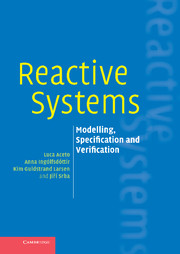Preface
Published online by Cambridge University Press: 17 March 2011
Summary
This book is based on courses that have been held at Aalborg University and at Reykjavík University over the last six years or so. The aim of these semester-long courses has been to introduce computer science students, at an early stage of their M.Sc. degrees or late in their B.Sc. degree studies, to the theory of concurrency and to its applications in the modelling and analysis of reactive systems. This is an area of formal-methods study that is finding increasing application outside academic circles and allows students to appreciate how techniques and software tools based on sound theoretical principles are very useful in the design and analysis of nontrivial reactive computing systems.
In order to carry this message across to students in the most effective way, the courses on which the material in this book is based have presented:
some prime models used in the theory of concurrency (with special emphasis on state-transition models of computation such as labelled transition systems and timed automata);
languages for describing actual systems and their specifications (with a focus on classic algebraic process calculi such as Milner's calculus of communicating systems and logics such modal and temporal logics); and
the embodiment of these models and languages in tools for the automatic verification of computing systems.
Information
- Type
- Chapter
- Information
- Reactive SystemsModelling, Specification and Verification, pp. x - xviPublisher: Cambridge University PressPrint publication year: 2007
